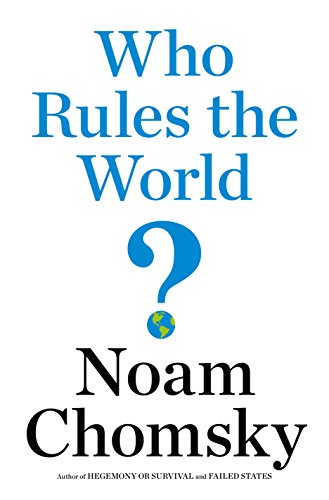Overview of “Who Rules the World?” by Noam Chomsky Link to heading
Summary Link to heading
“Who Rules the World?” by Noam Chomsky is a critical examination of the United States’ foreign policy and its role as a global superpower, focusing on the implications of its actions worldwide. Chomsky dissects how U.S. policies often contradict the democratic values it professes to uphold, revealing a pattern of aggression, exploitation, and prioritization of elite interests over global welfare. The book delves into historical events and modern international dynamics, presenting a narrative that challenges mainstream perspectives on America’s influence and accountability on the world stage.
Review Link to heading
Chomsky’s work is both impactful and provocative, offering a meticulously researched critique of American empire-building that resonates with readers who question global power structures. The book stands out for its depth of analysis and Chomsky’s ability to weave together historical, social, and political threads to deliver compelling arguments. While the dense, academic style can be challenging for some, it remains a significant contribution to discussions about global politics and power dynamics. Some critiques point to Chomsky’s unmistakable bias against U.S. foreign policy, suggesting that the book might benefit from a more balanced view; however, his reputation and scholarship lend weight to his arguments.
Key Takeaways Link to heading
- U.S. Hegemony: The United States exerts significant influence over global affairs, often prioritizing its strategic and economic interests.
- Contradictions in Policy: There is a frequent dissonance between America’s stated democratic ideals and its real-world actions, demonstrating a divergence between rhetoric and reality.
- Role of Propaganda: Media and cultural narratives are used to shape public perception and justify foreign policy decisions.
- Global Consequences: The long-term effects of U.S. actions often include destabilization, conflict, and humanitarian impacts across various regions.
- Change Advocacy: Chomsky encourages readers to be critical of power structures and to advocate for political and social reforms that prioritize human rights and equity.
Recommendation Link to heading
“Who Rules the World?” is recommended for readers interested in international relations, political science, and contemporary history. Those who appreciate critical analyses of global power structures and wish to understand the nuances behind U.S. foreign policy will find this book enlightening. It is especially suitable for academics, students, and politically engaged individuals who want to explore alternative viewpoints and deepen their understanding of global imperialism and its implications.
